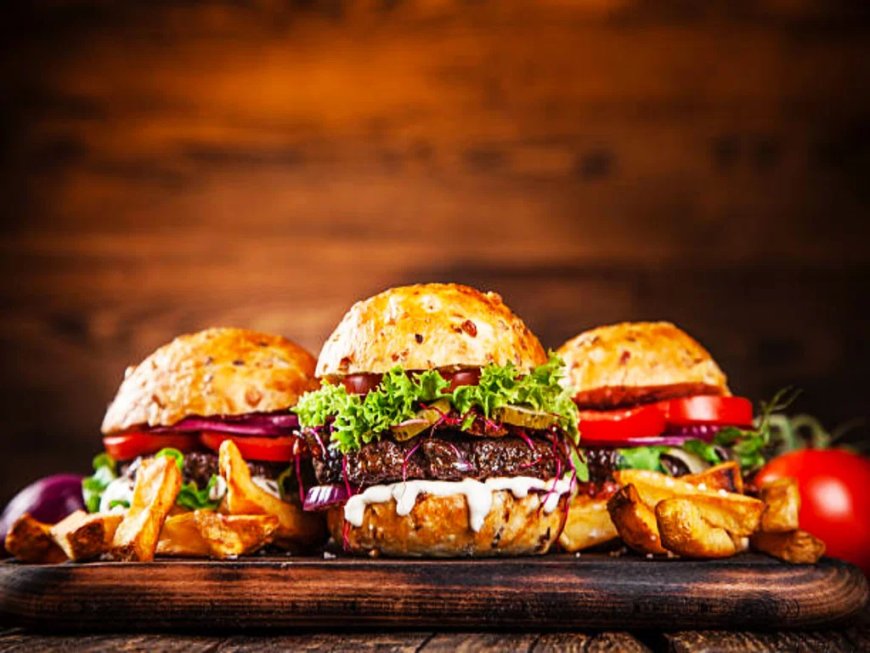What is healthier, a kebab or a burger?

When it comes to quick and tasty meals, both kebabs and burgers are popular choices around the world. Whether you're grabbing lunch during a busy workday or enjoying a weekend treat, the question often comes up which one is healthier?
This blog will look into the nutritional value of both kebabs and burgers in a simple, easy-to-understand way. We'll cover ingredients, calories, fat content, and cooking methods. By the end, youll have a better idea of which option suits your health goals more.
Understanding the Basics
Kebab: A kebab usually includes grilled or roasted meat (like chicken, lamb, or beef), often served with salad, flatbread, and sauces like yogurt or garlic mayo. The meat is often marinated and cooked on skewers or a vertical rotisserie.
Burger: A typical burger has a grilled or fried patty (beef, chicken, or plant-based), placed inside a bun along with cheese, sauces, and toppings like lettuce, tomato, or onions. Fast-food versions may include fried items and high-sugar sauces.
Both are loved for their flavour, but when it comes to health, the choice depends on how they are made and what ingredients are used.
Calories and Fat Content
The calorie count can vary depending on size and ingredients.
-
Kebab (chicken or lamb doner with salad and no sauces): Around 600800 calories
-
Burger (regular fast-food beef burger): Around 500700 calories
However, if you add cheese, extra sauces, and fries, the calorie count of both can go up quickly. In general, kebabs cooked with less oil and more vegetables can be lighter, while burgers with processed cheese and deep-fried patties may carry more saturated fats.
Heres the perfect kebab cafe: https://kula-cafe.com/best-kebab-london/
Meat Quality and Preparation
The type of meat and how it is cooked matters a lot.
-
Kebabs are usually grilled, which means less oil and fat compared to deep-fried or pan-fried options.
-
Many fast-food burgers use processed patties that may include added fat, preservatives, and fillers.
-
Homemade or freshly made burgers with lean meat can be much healthier than frozen or commercial ones.
In general, grilled meat in kebabs is a healthier cooking method than frying, making kebabs slightly better when looking at fat and oil content.
Bread and Fillings
The type of bread and add-ons can also make a big difference.
-
Burger buns are often made from white refined flour and may include sugar and preservatives.
-
Kebabs are often served in flatbread or pita, which can be lighter depending on the portion.
Fillings such as fresh salad and vegetables are more common in kebabs, while burgers often come with cheese and sauces that may be high in salt and fat.
Healthier Choice: It Depends
So, which is healthier a kebab or a burger? The honest answer is: it depends on the ingredients, cooking method, and portion size.
If the kebab is grilled, served with salad, and not loaded with heavy sauces or oily bread, it usually wins in terms of lean protein and fewer additives.
But a burger made at home using lean meat, whole grain buns, and fresh veggies can also be a smart option.
For someone trying to eat healthy, portion control, fewer sauces, and fresh ingredients are the key no matter what you choose.
In London, many cafes offer both kebabs and burgers, but few places focus on keeping things both tasty and health-conscious. One such spot known for fresh preparation and quality ingredients is Kula Cafe London. Their approach to using balanced flavours and clean cooking methods makes them a trusted choice among locals who enjoy eating out without compromising on health.
Heres the tasty burger cafe: https://kula-cafe.com/best-burger-london/
Final Thoughts
When choosing between a kebab and a burger, the healthier choice is not just the food type its how its made and whats inside. Go for grilled over fried, fresh over processed, and simple sauces over creamy ones. Whether you're ordering takeaway or cooking at home, these small decisions can make a big difference in your health journey.































